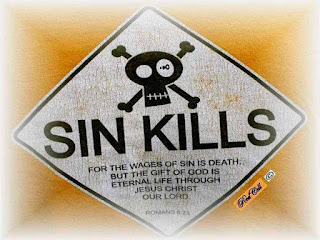Then
Samson said, “Let me die with the Philistines!” And he pushed with all his might, and the
temple fell on the lords and all the people who were in it. So the dead that he killed at his death were
more than he had killed in his life. (Judges
16:30)
Sin and death walked hand in hand into the Garden of
Eden. God had warned Adam and Eve that
if they disobeyed Him they would die.
James described the process this way, “But each one is tempted when he is drawn away by his own desires and
enticed. Then, when desire has
conceived, it gives birth to sin; and sin, when it is full-grown, brings forth
death.” (1:14-15) Samson stands as a living illustration of
this truth.
His life was marked by compromise (Judges
16:1-3). Little by little, he abandoned
his consecration to God. Flirtation with
the world leads to friendship with the world; friendship then leads to courtship;
courtship leads to spiritual adultery.
What Samson saw, he desired, and what he desired, he experienced. He was a mighty man who could beat back a
thousand soldiers, but could not conquer the beguiling form of a female. This would, at last, be his Achilles’ heel.
Samson’s judgment was clouded by the intoxicating
charm of a woman (Judges 16:4-21). This
brought him into the arms of Delilah and that would bring his doom. His relationship with her—as in the many
before—was utterly sensual and not spiritual.
Samson fell—not because he was too weak—but, was too strong. He was brim full of pride. After all, he had never lost a fight. He should have run from Delilah’s den like
his pants were on fire. Scripture says, “Flee fornication.” Instead he takes the serpent to his chest and
plays with it. He gets by for a while. Then the venomous fangs bring deadly poison
into his life. Delilah rocks him to sleep. Samson had forsaken two-thirds of his
Nazarite vow, and now abandoned the rest.
Strike three and you’re out! His
hair was not the source of his power, but it was in his dedication to God that
his long hair represented. The Lord
departed from him, and what is even worse—Samson did not know it. Sin binds, it blinds, and it grinds. Samson’s arms would no longer hold a beautiful
woman, but they would be held by bronze fetters—sin binds. His eyes would never again look with lust at
a lovely woman—sin blinds. He would
become a beast of burden—sin grinds.
The Bible solemnly warns, “The wages of sin is death,” (Rom.6:23). Samson’s story comes to that predicted end
(Judges 16:22-31). Instead of bringing
glory to God, Samson inspired the Philistines to honor their idol, Dagon, and
rejoice in his victory over the God of Israel.
When believers fall—especially leaders of God’s people—it results in
hell rejoicing. Thankfully, Samson
finally sought the Lord in repentance. “But where sin abounded, grace abounded much
more.” (Rom.5:20b). In the end, Samson conquered by crying out to
God instead of calling on his own resources.
In the final act of this tragedy, he brought down the house.

No comments:
Post a Comment